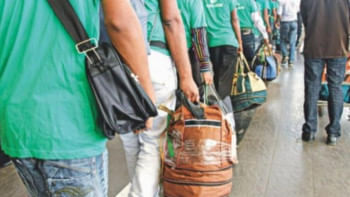Jail Killing Day: The indelible shame

The brutal killings of four national leaders by misguided soldiers inside Dhaka Central Jail in the early hours of November 3, 1975, remain an indelible shame on the national psyche. The compounding tragedy in the whole transaction is that the brutality and shame did not stir the national conscience until a favourable political scenario emerged in 1996.
The four slain leaders—Syed Nazrul Islam, Tajuddin Ahmad, AHM Qamaruzzaman and Captain Mansur Ali—were no ordinary men because for them, public service was more important than life itself. They had immense concern for public welfare and demonstrated their will to fight valiantly for justice.
When it was a question of displaying unflinching devotion to Bangabandhu and his ideals, Syed Nazrul Islam, Tajuddin Ahmad, AHM Qamaruzzaman and Captain Mansur Ali were second to none. They did not compromise with the murderous cabal to earn freedom or a cozy position in the establishment, while others capitulated in the most shameful manner. Records show that they could have bargained with the assassins and their patrons but they did not wilt. This was a rare instance of displaying inner strength; a necessity for establishing truth under adversity.
The tragedy in Bangladesh is that we, as a nation, have not been able to come out of our self-absorption and it was, thus, no surprise that it took 21 years to officially recognise the culpability of a heinous offence committed in the most blatant manner. Cynics say that we have in our midst far too many "boneless wonders." With such men, expediency is all. The four slain leaders, however, were men who had the courage not to submit or yield and were like rocks in the wilderness of shifting sands.
The historical significance of the sacrifice of the four national leaders cannot be lost sight of. We have to admit that by lingering for a painfully long time in taking legal action, we have made ourselves small. Must we not admit that vigorous societies have to harbour a certain extravagance of objectives, so that men wander beyond the safe provision of personal gratifications?
As mentioned, the state sprang into action to investigate the ghastly misdeeds only when a favourable scenario emerged. However, the task was not easy by any account. The First Information Report (FIR) had mentioned the name of only one person as accused and four accomplices were mentioned as unknown.
Significantly, the original FIR could not be located despite the best efforts given in tracing them from the concerned court, police station and CID office. Finally, a hand-written copy of the original FIR was located at Police Headquarters.
The investigator of the gruesome crime thus had to commence his work with a handicap. Curiously, although the FIR was lodged on November 4, 1975 at Lalbagh police station, the investigation officer, the then Deputy Superintendent of Police (DSP) Saifuddin, was not allowed to visit the place of the incident despite repeated efforts, thus failing to take initial steps towards the investigation.
Between 1975 and 1996, the investigation could not get started due to the indifference of the establishment, and consequently many relevant supporting papers and direct evidence disappeared, much to the consternation of the prosecution. Some of the jail employees of the relevant period had been located from different places around the country after prolonged efforts and the complainant of the incident, the very old former DIG Prison, was traced from Sandwip Island to prove the FIR. Some old files had been retrieved from the prison records but copies of the inquest and post mortem reports of the slain leaders could not be traced.
The then establishment instituted a Judicial Commission after the incident, but the said Commission could not complete their inquiry. The relevant files regarding this Commission could not be traced at the ministry as some interested quarters were suspected to have caused its disappearance.
Admittedly, the investigator's job was made very difficult.
The misguided soldiers who committed the atrocities were rewarded with diplomatic postings. The job of tracing them and bringing them under the law was a challenging task. These accused persons were staying in Bangabhaban, the seat of power, and from there they proceeded to Dhaka Central Jail to commit the massacre.
After a lapse of so many years, it was extremely difficult to trace the relevant files in these sensitive places. Equally difficult was locating important exhibits from Radio Bangladesh.
Despite all the odds, encumbrances and limiting factors, the case ended in charge sheets against 21 accused persons, including 14 absconders. The trial court awarded death sentence to three accused persons and sentenced 12 to life imprisonment, thanks to the exacting and gritty investigation of Abdul Kahhar Akand, the then Senior Assistant Superintendent of Police. The trial was held in the ordinary court of law, where the defence enjoyed all statutory privileges.
Of significant consequence is the fact that our sociopolitical situation turned for the worse with the tragic murder of the Father of the Nation and the four national leaders in 1975.
Muhammad Nurul Huda is a former IGP.
This article was originally printed on November 3, 2015 in The Daily Star.


 For all latest news, follow The Daily Star's Google News channel.
For all latest news, follow The Daily Star's Google News channel. 



Comments